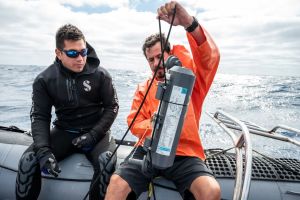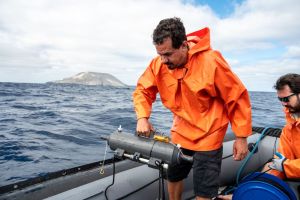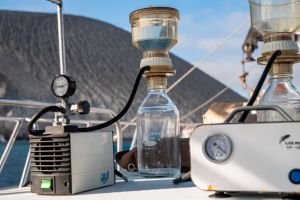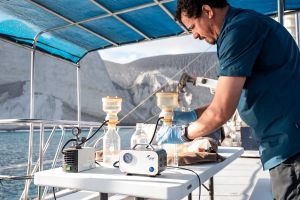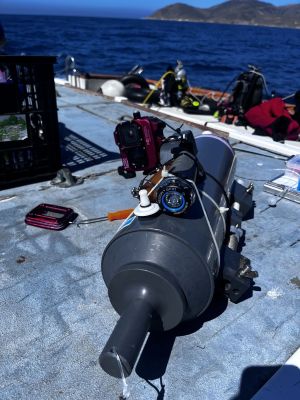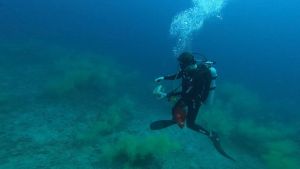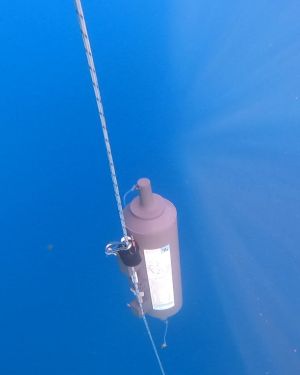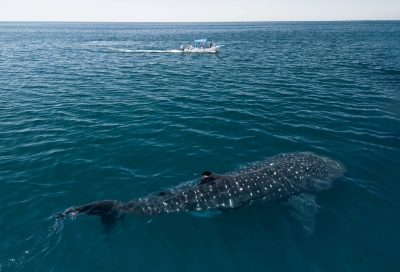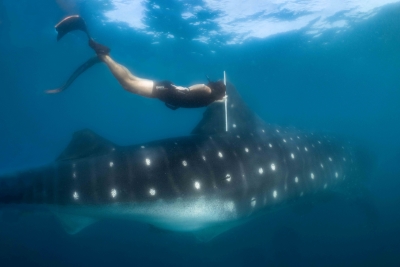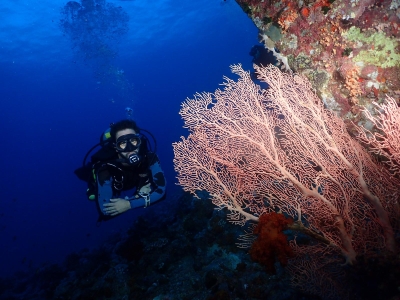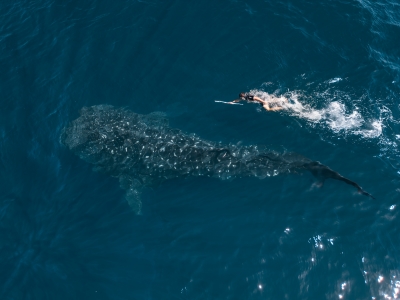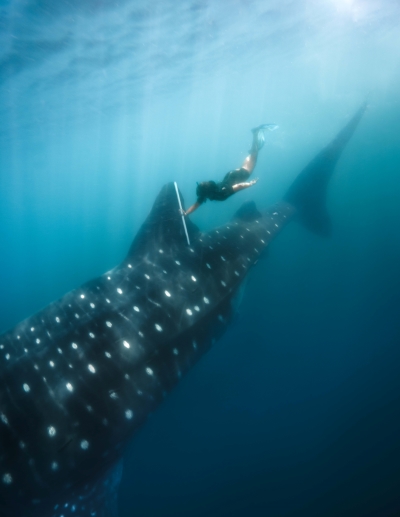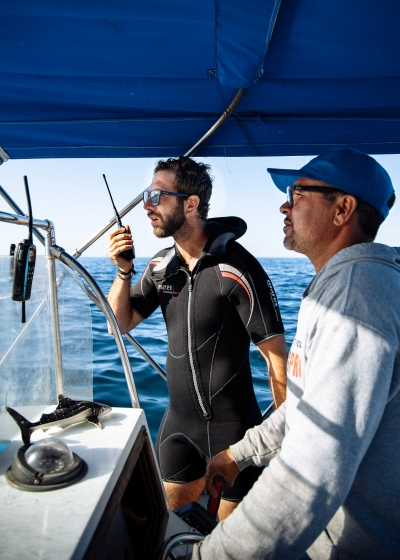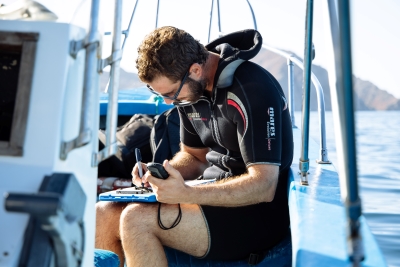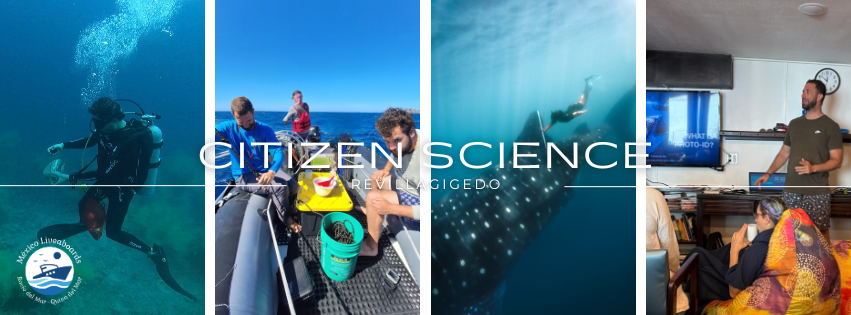
Mexico Liveaboards offer a truly unique experience with our Citizen Science Program. These trips include a marine biologist specializing in subjects such as manta rays, sharks, humpback whales, marine mammals, marine ecology, pelagics, reef ecology, invertebrate ecology, diving science and medicine and more. Activities include animal identification, tagging, fish/animal counts, census monitoring, human and climate impact studies, etc.
Much of the information that is collected is included in papers and presentations to governments and NGO's to help with the conservation of these areas and animals. In addition, this information is provided to websites to educate lay persons helping to further conservation awareness.
Divers can be involved as much or as little as they like including hands-on research and will enjoy interactive evening presentations by the scientists.
Join us on one of these amazing expeditions and you will never look at the ocean the same again.
CITIZEN SCIENCE EXPEDITIONS:
DEEP-SEA ENVIRONMENTAL DNA CITIZEN SCIENCE EXPEDITION
Revillagigedo
ABOUT THE TRIP
These trips follow the same itinerary as our other Revillagigedo adventures, but are taken to a whole new level by making it a citizen science expedition.
Prepare to embark on an extraordinary underwater odyssey with Dr. Adrian Munguia-Vega to join a groundbreaking expedition for the fourth consecutive year. This isn't just any diving trip – it's a thrilling plunge into the heart of deep-sea marine biodiversity, where science meets adventure in the pristine waters of the Revillagigedo Archipelago. You'll be at the forefront of cutting-edge marine research, wielding the power of non-invasive environmental DNA (eDNA) to unlock the hidden secrets of the archipelago's biodiversity. Picture yourself as a scientific detective, collecting water samples that hold microscopic traces to the presence of elusive marine species. With each sample, you're contributing to a groundbreaking ecological baseline that's reshaping our understanding of this underwater paradise. But the true adventure lies in the unexplored depths. Brace yourself as we deploy state-of-the-art sampling devices into the abyss, plunging up to 300 meters into mysterious marine canyons and never seen underwater seascapes. These high-tech marvels, equipped with depth recorders and video cameras, will be your eyes and ears in a realm few humans have ever witnessed. As we go deeper, you'll discover that the twilight zone between 80-280 meters harbors a hidden world teeming with life – a parallel universe of biodiversity waiting to be explored. You will also have the opportunity to learn to identify and record up to forty species of fish, sharks and rays as we will be making visual underwater counts of the species to complement and validate the DNA samples.
You can see an example here: https://doi.org/10.1111/1755-0998.13375.
The results of previous expeditions will leave you awestruck. Over 10,000 different marine species from 41 distinct phyla (including over 500 species of fishes) have been cataloged, painting a vivid picture of the archipelago's incredible diversity.
See full report here: https://shorturl.at/RWh0n
Every fish you spot, every species you identify, contributes to our understanding of this complex ecosystem. Join us as we push the boundaries of marine exploration, unraveling the mysteries of the deep and contributing to the preservation of one of the planet's most remarkable underwater ecosystems. Are you ready to dive into the unknown?
DAILY SCIENTIFIC ACTIVITIES
- Water sampling while scuba diving < 25 m
- Fish surveys while scuba diving < 25 m
- Water sampling, video, temperature, and depth recording, and in marine canyons 80-300 m with Niskin oceanographic bottles rigged with sensors
- Filtering and preservation of water samples for eDNA analyses
- Presentations, both formal and informal, about marine biodiversity and deep-sea technologies for ocean exploration
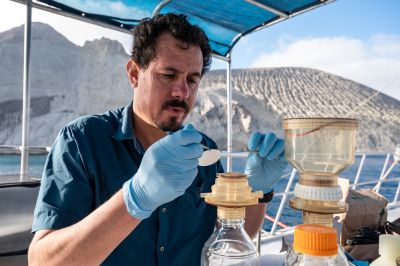
ABOUT ADRIAN
Dr. Adrian Munguia-Vega is a marine biologist and population geneticist, currently a researcher at the Conservation Genetics Lab at the University of Arizona, Tucson, where he earned his PhD. He is also the founder and director of an independent genomics research facility (Applied Genomics Lab) based in La Paz, Baja California Sur, Mexico, where he works as a consultant. He conducts transdisciplinary research at the intersection of academia, local communities, government, and civil society organizations. Adrian has over 20 years of experience, has directly advised a dozen graduate students, and has authored over 100 peer-reviewed scientific publications on applied genetics and genomics across a broad range of marine and terrestrial species.
View his scientific research here: https://www.researchgate.net/profile/Adrian-Munguia-Vega-2
The common thread in his research projects is the application of genetic and genomic tools to understand, manage, and conserve biodiversity. He is Co-Pi of a 6-year National Science Foundation geogenomics project and a National Geographic Society Explorer.
DATES AND RATES
ROCIO DEL MAR
May 6 - 15, 2026
$4195 per person, double occupancy
ROCIO DEL MAR
May 10 - 19, 2027
$4295 per person, double occupancy
ROCIO DEL MAR
May 14 - 23, 2028
$4295 per person, double occupancy
WHAT THE PRICE INCLUDES AND DOES NOT INCLUDE
The above price includes all taxes, port fees, meals, beverages, tanks, weights, and complimentary beer and wine. The only things not included are:
National Park Fee - Park fee is subject to change without notice
Nitrox Fee - $140
Transfers to and from the boat
Crew gratuity (typically 10%-15% of the fare)
CLICK HERE FOR REVILLAGIGEDO PARK FEES AND EXEMPTIONS
* Park fees are subject to change without notice
WHALE SHARK & MANTA RAY CITIZEN SCIENCE EXPEDITIONS
Revillagigedo
ABOUT THE TRIP
These trips follow the same itinerary as our other Revillagigedo adventures, but are taken to a whole new level by making it a citizen science expedition.
Embark on a bewitching adventure with Beto Garcia, the passionate Executive Director of Whale Shark Mexico, as we set sail to unravel the mysteries of the elusive whale shark and the oceanic manta ray. Immerse yourself in the world of citizen science as we employ the technique of photo identification to capture the essence of these majestic creatures without disturbing their peace. The secrets of the deep will be unveiled as we use cutting-edge software to identify individuals and the complex population structures of both species. Enjoy daily presentations and participate with Beto as he collects data on these incredible animals. We will unlock even deeper secrets by attaching satellite tags to these creatures and tracing their movements if possible. Join us on this enchanting voyage into the unknown depths, where the realm of the shark reigns supreme.
Enjoy 6-7 presentations with topics to include:
- Biology and ecology of whale sharks
- Conservation Biology of the whale shark
- Conservation biology of manta rays
- I3S software for whale shark and giant manta ray photo identification
Activities to include: :
- Whale shark and manta ray photo-identification
- Zooplankton sampling and looking at samples under a microscope)
- Measuring sharks and bony fish using a stereo-video system to estimate their length and determine the length-frequency distribution of the most common species
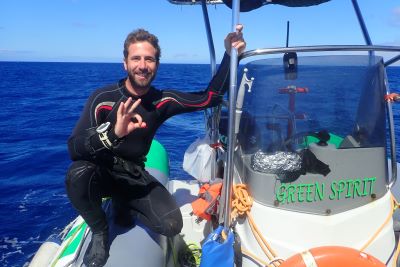
ABOUT ALBERTO (BETO) GARCIA
Originally from Madrid, Spain, a landlocked area, Beto developed his interest and passion for marine life, particularly sharks, after watching documentaries on TV. He discovered scuba diving at the age of 12 and immediately fell in love with the ocean. Since graduating with a degree in Biology in 2014, Beto has worked on several marine conservation projects in Costa Rica and Malaysia. His conservation journey began in a remote location in the Costa Rican jungle, where he worked on sea turtle nesting beaches to protect Leatherback, Green, Hawksbill, and Olive Ridley sea turtles. In 2017, Beto started working on a sea turtle conservation project on Tioman Island (Malaysia), where he implemented a sea turtle photo-identification program and boosted the creation of a coral reef monitoring and conservation program. After spending a considerable amount of time back home due to the COVID-19 pandemic, Beto moved to La Paz in 2021 to pursue a master’s degree in marine resources management. Due to his motivation, he also began collaborating with Whale Shark Mexico, which opened the door for him to return to the forefront of marine conservation. At last, he is now fulfilling his childhood dreams of protecting and working for sharks. Additionally, Beto is an experienced SCUBA diver and divemaster who has been diving in some of the world's most beautiful and diverse dive sites. Beto is now Whale Shark Mexico's Director, and he is in charge of the fieldwork, research projects, and the volunteer program. For more information about Whale Shark Mexico, visit www.whalesharkmexico.com
DATES AND RATES
QUINO DEL MAR
May 17 - 26, 2026
$4195 per person, double occupancy
QUINO DEL MAR
May 24 - June 2, 2027
$4295 per person, double occupancy
QUINO DEL MAR
May 26 - June 4, 2028
$4295 per person, double occupancy
WHAT THE PRICE INCLUDES AND DOES NOT INCLUDE
Prices include all taxes, port fees, meals, beverages, tanks, weights, and complimentary beer and wine. The only things not included are:
National Park Fee *
Nitrox Fee - $140
Transfers to and from the boat
Crew gratuity (typically 10%-15% of the fare)
CLICK HERE FOR REVILLAGIGEDO PARK FEES AND EXEMPTIONS
* Park fees are subject to change without notice


